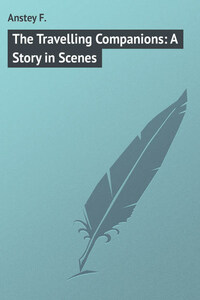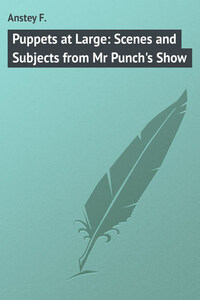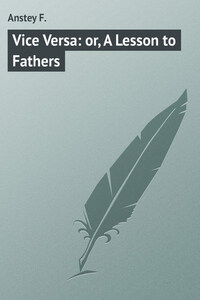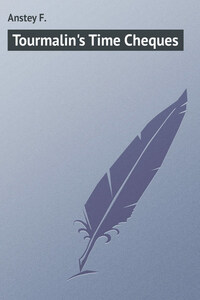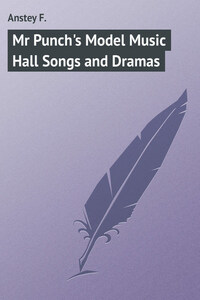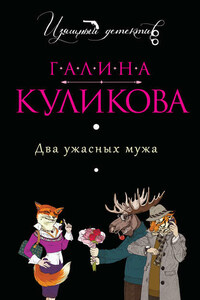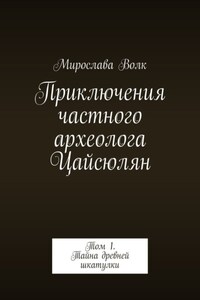Scene —An Excursion Agent's Offices. Behind the counters polite and patient Clerks are besieged by a crowd of Intending Tourists, all asking questions at once.
First Intending Tourist. Here – have you made out that estimate for me yet?
Clerk. In one moment, Sir. (He refers to a list, turns over innumerable books, jots down columns of francs, marks, and florins; reduces them to English money, and adds them up.) First class fares on the Rhine, Danube and Black Sea steamers, I think you said, second class rail, and postwagen?
First Int. T. I did say so, I believe; but you had better make it second class all through, and I can always pay the difference if I want to.
[The Clerk alters the sums accordingly, and adds up again.
Clerk. Fifty-five pounds fourteen and a penny, Sir. Shall I make you out the tickets now?
First Int. T. Um, no. On second thoughts, I'd like to see one of your short Circular Tours for the English Lakes, or Wales, before I decide.
[The Clerk hands him a quantity of leaflets, with which he retires.
Enter Mr. Clarendon Culchard, age about twenty-eight; in Somerset House; tall; wears glasses, stoops slightly, dresses carefully, though his tall hat is of the last fashion but two. He looks about him expectantly, and then sits down to wait.
Culchard (to himself). No sign of him yet! I do like a man to keep an appointment. If this is the way he begins– I have my doubts whether he is quite the sort of fellow to – but I took the precaution to ask Hugh Rose about him, and Rose said he was the best company in the world, and I couldn't help getting on with him. I don't think Rose would deceive me. And from all I've seen of Podbury, he seems a pleasant fellow enough. What a Babel! All these people bent on pleasure, going to seek it in as many directions – with what success no one can predict. There's an idea for a sonnet there.
[He brings out a pocket-book, and begins to write – "As when a – "
An Amurrcan Citizen (to Clerk). See here, I've been around with your tickets in Yurrup, and when I was at Vernis, I bought some goods at a store there, and paid cash down for 'em, and they promised to send 'em on for me right here, and that was last fall, and I've never heard any more of 'em, and what I want you should do now is to instruct your representative at Vernis to go round and hev a talk with that man, and ask him what in thunder he means by it, and kinder hint that he'll hev the Amurrcan Consul in his hair pretty smart, if he don't look slippier!
[The Clerk mildly suggests that it would be better to communicate directly with the American Consulate, or with the tradesman himself.
The A. C. But hold on – how'm I goin' to write to that sharp, when I've lost his address, and disremember his name? Can't you mail a few particulars to your agent, so he'll identify him? No? (Disappointed.) Well, I thought you'd ha' fixed up a little thing like that, anyhow; in my country they'd ha' done it right away. Yes, Sir!
[He goes away in grieved surprise.
Enter Mr. James Podbury, age twenty-six; in a City Office; short, fresh-coloured, jaunty; close-cut dark hair. Not having been to the City to-day, he is wearing light tweeds, and brown boots.
Podbury (to himself). Just nicked it – (looks at clock) – more or less. And he doesn't seem to have turned up yet. Wonder how we shall hit it off together. Hughie Rose said he was a capital good chap – when you once got over his manner. Anyhow, it's a great tip to go abroad with a fellow who knows the ropes. (Suddenly sees Culchard absorbed in his note-book.) So here you are, eh?
Culch. (slightly scandalized by the tweeds and the brown boots). Yes, I've been here some little time. I wish you could have managed to come before, because they close early here to-day, and I wanted to go thoroughly over the tour I sketched out before getting the tickets.
[He produces an elaborate outline.
Podb. (easily). Oh, that's all right! I don't care where I go! All I want is, to see as much as we can in the time – leave all the rest to you. I'll sit here while you get the tickets.
An Old Lady (to Clerk, as Culchard is waiting at the counter). Oh, I beg your pardon, but could you inform me if the 1·55 train from Calais to Basle stops long enough for refreshments anywhere, and where they examine the luggage, and if I can leave my hand-bag in the carriage, and whether there is an English service at Yodeldorf, and is it held in the hotel, and Evangelical, or High Church, and are the sittings free, and what Hymn-book they use?
[The Clerk sets her mind free on as many of these points as he can, and then attends to Culchard.
Culch. (returning to Podbury with two cases bulging with books of coloured coupons). Here are yours. I should like you to run your eye over them, and see that they are correct, if you don't mind.
Podb. (stuffing them in his pocket). Can't be bothered now. Take your word for it.
Culch. No – but considering that we start the first thing to-morrow morning, wouldn't it be as well to have some idea of where you're going? And, by the way, excuse me, but is it altogether prudent to keep your tickets in an outside pocket like that? I always keep mine, with my money, in a special case in an inner pocket, with a buttoned flap – then I know I
